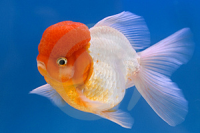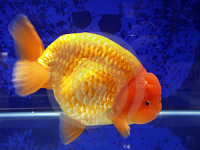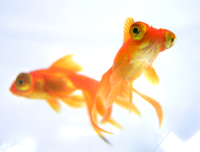
Garden Supplies Home > Garden Ponds > Japanese Goldfish
|
Japanese GoldfishJapanese Goldfish is the generic term that covers the various species of goldfish that are raised by fish breeders in Japan. The main varieties are Ryukin, Tosakin, Ranchu, Oranda, Demekin as well as the common golfish known as Wakin. Of these the Tosakins are probably the rarest and most beautiful result of the hundreds of years of japanese goldfish breeding.
There are also Calico Ranchu which are similar but with the addition of small dark colored spots and a dark tail. The Ranchu has no dorsal fin and this fact sometimes causes the fish to lose its balance, and to swim either in a vertical position (head downwards) or else upside down altogether. The Ryukin in some respects is intermediate between the chinese fantail and the veiltail: it has a deep body and usually a medium to fairly long tail. It is commonly found in red, white and orange color. The Ryukin was developed in China and imported and further developed in Japan. The Tosakin is a variety of the Ryukin which has an undivided double tail, with the tail splayed sideways and forwards. They were bred for viewing from above, and much of the effect of the spectacular tail is lost when viewed from the side.
Japanese goldfish prefer shallow water and minimal water flow, so be sure to make sure you get the right water filters fast when caring for these goldfish. The ideal depth is eight inches although a deeper pond can be used if necessary. The shallow water encourages the Tosakins to keep their tails up which makes for a better display. They should be fed high quality pellets or flakes and red wiggler or bloodworms as a treat for best color and growth rate.
Above Ground Pond Waterfall Pond Bridges Keep Pond Ice Free Water Garden Lighting Outdoor Solar Fountains Solar Power Pond Filters Koi Pond Supplies Japanese Goldfish Aquatic Plants The Garden Supplies Advisor Home Page
|
Garden Supplies Home > Garden Ponds > Japanese Goldfish Could not find what you were looking for? 
Custom Search
Copyright © 2004 - 2023 All rights reserved.
|
Garden Supplies Advisor.com is a participant in the Amazon Services LLC Associates Program, an affiliate advertising program designed to provide a means for sites to earn advertising fees by advertising and linking to amazon.com.
About
 The Redcap Oranda, as its name implies, has a red cap-like growth on the
top of its head with the remainder of its body being a pale silver color. Also known as the Lionhead Oranda
because of its fearsome appearance. While the common body color is silver, oranda are also found with red or
yellow and even chocolate coloring.
The Redcap Oranda, as its name implies, has a red cap-like growth on the
top of its head with the remainder of its body being a pale silver color. Also known as the Lionhead Oranda
because of its fearsome appearance. While the common body color is silver, oranda are also found with red or
yellow and even chocolate coloring. The Ranchu are found with a number of different colorings. From single
color red-metallic, red head and white body, white head and red body, and variegated red-white coloration.
Many more species of fish can be seen on various kids programs such as any pbs newshour or a
national geographic special about fish or fish in culture.
The Ranchu are found with a number of different colorings. From single
color red-metallic, red head and white body, white head and red body, and variegated red-white coloration.
Many more species of fish can be seen on various kids programs such as any pbs newshour or a
national geographic special about fish or fish in culture. The Demekin is characterized by its protruding eyes. It is also known as telescope
eye, globe eye or dragon eye goldfish. It is according to the amount of its eye distortion that the value of
the fish is gauged, and the shape and size of the fins are of secondary importance.
The Demekin is characterized by its protruding eyes. It is also known as telescope
eye, globe eye or dragon eye goldfish. It is according to the amount of its eye distortion that the value of
the fish is gauged, and the shape and size of the fins are of secondary importance.